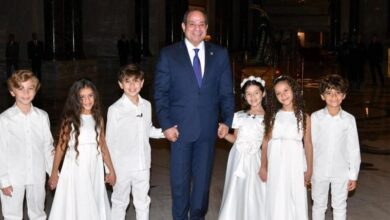US Middle East envoy George Mitchell made a point of telling reporters from the start not to expect any juicy details about the closed-door negotiations taking place between Israeli Prime Minister Benjamin Netanyahu and Palestinian Authority President Mahmoud Abbas.
A proper high-stakes negotiation, said Mitchell, who successfully negotiated peace in Northern Ireland, requires obsessive secrecy.
“For these negotiations to succeed, they must be kept strictly confidential and treated with the utmost sensitivity,” he said.
Mitchell then spent about 15 minutes politely refusing to provide any details about whether any breakthroughs had been achieved between the two sides. He did say, however, that “things were moving in the right direction” and that he was convinced that both Abbas and Netanyahu were serious about forging a lasting peace deal.
“Our common goal remains two states for two peoples: the state of Israel and a sovereign, independent and viable state of Palestine, living side by side in peace,” Mitchell said. He added that the US “will be an active partner throughout. We will place our full weight behind these negotiations.”
Abbas and Netanyahu met separately in the morning with President Hosni Mubarak, then had a three-way meeting with US Secretary of State Hillary Clinton. In a possible sign of progress, a second tri-lateral meeting with Clinton was unexpectedly added to the schedule on Wednesday afternoon. Mitchell’s briefing with reporters was delayed by more than 90 minutes due to longer-then-expected discussions.
The two sides will now move on to another round of talks in Jerusalem on Thursday, accompanied by Mitchell and Clinton.
The most immediate item on the agenda is one that threatens to scuttle this latest peace initiative from the start–the fate of Israel’s ten-month moratorium on settlement construction in the occupied West Bank and predominantly Arab East Jerusalem.
The voluntary construction freeze expires on 26 September, and forces within Netanyahu’s right-wing coalition–including his own foreign minister, Avigdor Lieberman–have publicly stated that settlement construction should resume immediately.
Settler leader Gershon Mesika told Israeli daily Haaretz on Sunday that a continuation of the building freeze “will be considered an announcement of the end of term for the Netanyahu government.”
Palestinian negotiators, meanwhile, have repeatedly threatened to walk out of the talks if construction resumes.
“Peace and settlements are two parallel lines that don’t meet,” senior Abbas deputy Saeb Erekat said earlier this week before heading to Egypt. “It’s time for Israel to realize this fact.”
Netanyahu in recent days has sought a middle ground, floating the idea of expanding existing settlement blocs in East Jerusalem while maintaining the ban on construction in the West Bank.
But Mitchell, in his brief public comments on Wednesday, did not give Netanyahu much room to maneuver. The former US senator said that it “makes sense” for Netanyahu to extend the blanket construction ban, especially given the positive start to the latest round of peace talks.
“We know that this is a politically sensitive issue in Israel,” Mitchell said. “We’ve also called on President Abbas to take steps that help encourage and facilitate this process.”
Just what those steps might be, however, remains unclear. But some analysts see a delicate dance of mutual concessions taking place behind the scenes.
“Both players have a weak hand. Abbas can't embarrass Obama and bolt the talks and Netanyahu can't risk losing power,” wrote Haaretz diplomatic correspondent Aluf Benn. “So the real question is not ‘what will happen at the end of the freeze,’ but what Netanyahu and Abbas will get in return for giving up their original positions.”




